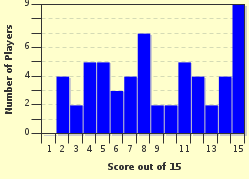Quiz Answer Key and Fun Facts
1. Where in Wales was the birth place of the singer and comedian Max Boyce?
2. Which of these sports is intrinsically associated with the Welsh singer/songwriter and comedian Max Boyce?
3. Although born and raised in Wales, the singer/songwriter and comedian Max Boyce could not speak Welsh.
4. After an apprenticeship spent in the clubs of Wales, the singer/songwriter and comedian Max Boyce found national fame when he appeared on a TV talent show. What was it called?
5. Which sporting trio were immortalised by the Welsh singer/songwriter and comedian Max Boyce?
6. As a former miner, Max Boyce had a compassionate involvement with the mining communities of Wales and wrote several songs about them. According to his song "Duw It's Hard", what had the pithead baths of one closed-down colliery become?
7. What achievement could the Welsh singer Max Boyce claim about his album "We All Had Doctors' Papers"?
8. After several gold-selling records, Max Boyce became a regular on British TV screens. In one series he filmed his time at a bootcamp with an American Football team. Which team?
9. At a Max Boyce concert, what was the proper reply by the audience to the singer's calls of "Oggy, Oggy, Oggy"?
10. The Welsh singer and comedian Max Boyce formerly worked down the coalmines and wrote many songs about mining. In one song he lamented the hardship and the illnesses that were part and parcel of mining. What was the song called?
11. Which of these songs was the subject of a Max Boyce parody?
12. In the Max Boyce song 'Hymns And Arias', what had once been in a bottle given by Welsh rugby fans to an England supporter?
13. According to Max Boyce, what was the most priceless commodity known to Welshmen?
14. In the 1980s, Max Boyce featured in a movie documentary called "To The North of Kathmandu". Which of these former Beatles was a co-star?
15. Although he wrote many of his own songs, the Welsh singer and comedian Max Boyce also adapted the words of one of Wales's best known poets into a song he called 'When We Walked To Merthyr Tydfil'. Who was that poet?
Source: Author
darksplash
This quiz was reviewed by FunTrivia editor
CellarDoor before going online.
Any errors found in FunTrivia content are routinely corrected through our feedback system.

